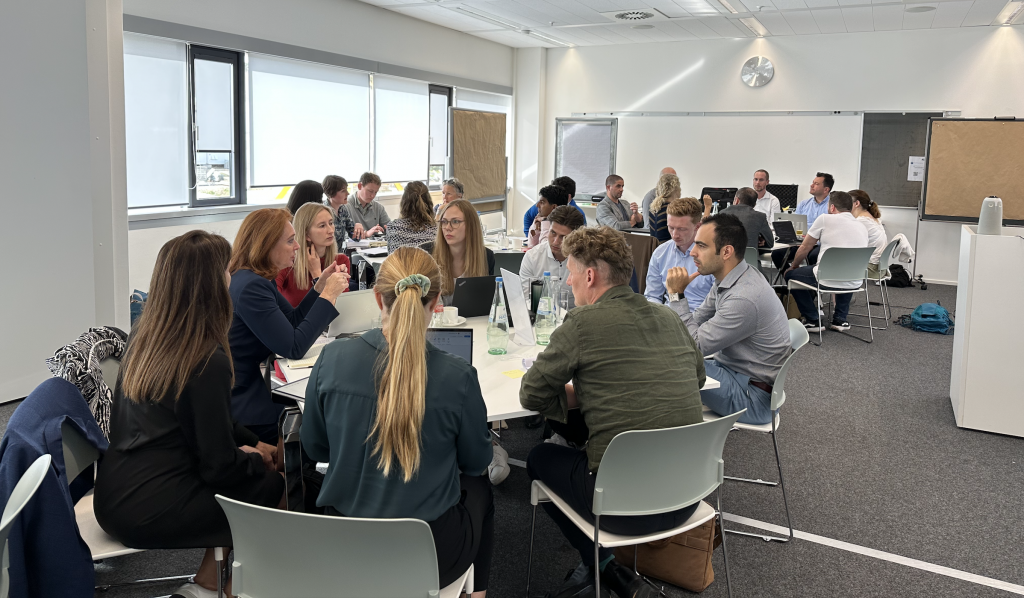Dear Reader,
Welcome to the second edition of the Invest4Health project newsletter, where we mark a significant milestone – one year of progress.
The Invest4Health (I4H) Horizon Europe project, launched in January 2023, aims to renew health promotion and disease prevention funding by challenging traditional financing methods. Our innovative strategies view health as an investment rather than a cost, prioritizing disease prevention and health promotion as a best buy.
Embracing the principles of prevention over reactive solutions, I4H seeks to transform how health initiatives are financed, employing approaches like smart capacitating investment, social franchising, and new governance mechanisms. We aim to deliver tangible results through validated models, enabling decision-makers to prioritize risk-sharing and resource pooling for health promotion and disease prevention. We showcase the value of smart financing through return-on-investment analysis and strategic pricing, encouraging investment in effective and efficient services for active and healthy living.
We hope you find our work insightful and engaging as we reflect on key achievements and team perspectives and look ahead to exciting developments.
The Invest4Health Team
IN FOCUS:
MILESTONES FROM KEY WORK PACKAGES
DEVELOPING THE CONCEPT OF SMART CAPACITATING INVESTMENT
A key objective of the I4H project is to develop and strengthen how the concept of Smart Capacitating Investment (SCI) in public health is framed, communicated, and utilized. This work is being led by Professor Maureen Rutten-van Mölken of Erasmus University Rotterdam and Professor Rhiannon Tudor Edwards of Bangor University, Wales, UK, in collaboration with Syreon Research Institute and EuroHealthNet.
Our first step is to explore if we can find any investment models being used in public health and, more broadly, if they might be similar to our initial thinking about the need for SCI. So, we are investigating if such models exist and are being used across the public, private, and voluntary sectors and at different health ecosystem levels (e.g., local to national).
To do this, we are conducting a scoping review of existing evidence from published and grey literature on innovative health promotion and disease prevention investments. This review will inform the development of a more robust conceptual framework for systematically describing SCI in public health. Our findings will also capture variations in models relevant to SCI and their vital defining characteristics. Further details about the scoping review can be found in our research protocol, accessible in the Open Science Framework Platform database HERE.
Simultaneously, Dr Balázs Babarczy from Syreon Research Institute is leading a series of interviews with social investors, national and European policymakers, healthcare chief finance officers, consultants, and academic experts to understand the drivers and revenue models of different SCI-compatible investment techniques. These insights will also be fed into the development of the SCI concept.
The conceptual framework for SCI will underpin the entire I4H project, including the development and then testing of SCI models in our real-world testbed.
BUSINESS MODELS FOR SMART CAPACITATING INVESTMENTS

I4H is also focused on identifying existing business models within healthcare and other fields that can be conducive and compliant with the needs of SCI. Building on this, we aim to explore, through our four distinct test beds (pilots) in Sweden, Germany, the UK (Wales), and Spain, the key factors underlying the sustainable implementation, replication, and scaling of SCI models locally and at regional levels.
While we seek to understand and build SCI models based on previous research, we are also working to learn iteratively from these test beds, thereby making our tasks and outcomes entirely integrated and interdependent.
Two questions are at the heart of SCI Business model design and drive our processes. How can we establish connections among previously disconnected stakeholders potentially interested in wellbeing models, such that each stakeholder plays a meaningful role and each derives individual value from participating while simultaneously enabling collective value creation for the end (individual) beneficiary? And, how do we develop models that incorporate citizen co-governance in decision-making?
For the former, we are exploring the concept of Collaborative Spaces that may be digital and physical. For the latter, we are forming a Citizen Patient Advisory Group (CPAG) at the project level that will also have representations from each test bed.
In sum, Business Models for SCI within Invest4Health is a broad overarching theme encompassing the roles, motivations, and participation of various institutional stakeholders, individual beneficiaries, citizens, and the dynamic interactions across all these actors to result in sustainable new financial models for SCI.
We are eager to showcase the results of our collaborative efforts in the upcoming semester, including the models developed through collective discussion and cooperation and our progress involving citizen groups locally and at the project level.
STRATEGIC REPLICATION: INTRODUCING INNOVATIVE WAYS TO FINANCE HEALTH THROUGH SOCIAL FRANCHISING IN SMART CAPACITATING INVESTMENT MODELS
Social franchising comes into focus as we progress through the complex stages of creating, testing and validating the Smart Capacitating Investment (SCI) models. We are developing a comprehensive SCI package for a large-scale showcase. In a strategic move, we employ social franchising as the avenue for widespread replication to support financially our health promotion and disease prevention solutions.
Ensuring Long-lasting Impact: Validating SCI Models Across Diverse Regions
Commitment to the impact, value, and sustainability of the Invest4Health solution is paramount. We are diving into validating SCI models across diverse European regions for targeted health promotion and disease prevention interventions to witness a transformative approach to financing public health.
EXPLORING THE INVEST4HEALTH TESTBEDS
REGION SKÅNE, SWEDEN: FOCUSING ON TACKLING HEALTH INEQUALITIES IN MENTAL HEALTH AND WELLBEING AMONG CHILDREN

A testbed is a real-world environment for comprehensive testing and experimentation to evaluate the performance, functionality, and feasibility of various technologies, systems, or prototypes. In our project, testbeds in the European region serve as practical environments to test and refine different investment models to finance interventions in the area of health promotion and disease prevention.
We will assess the strengths and weaknesses of different systems, policies, and protocols and we will collect information to enable us to prioritize investments and make informed decisions within each testbed also involving citizens to ultimately drive improvements in health promotion and disease prevention practices and services.
We are pleased to introduce our first testbed: Region Skåne, Sweden.
TEAM TALKS: EXPLORING PERSPECTIVES
WITH INVEST4HEALTH TEAM MEMBERS
INTERVIEWS WITH OUR PROJECT LEADERS

Let us introduce our team, offering insights into the minds leading at Invest4Health. We’re launching a series of interviews featuring key team members. Join us as we uncover the stories, roles, and unique perspectives that bring the Invest4Health project to life.
First, meet Jolanda Van Vliet, our Project Coordinator; Bengt Stavenow, Project Co-Coordinator and Co-Chair of the Common Architecture Reference Group; and Joanna Lane, Co-Chair of the Common Architecture Reference Group.
Let’s delve into the personalities behind the project and discover the stories, perspectives, and passion that drive the success of our project. Three individuals, ten questions!
CONSORTIUM
Our consortium is made up of 18 partners from 8 countries.
The partnership has four TESTBED regions representing various health systems
covering 351 municipalities:
Galicia in Spain, West Wales in the UK, Nord Rhein Westphalia in Germany, and Skane in Sweden.



